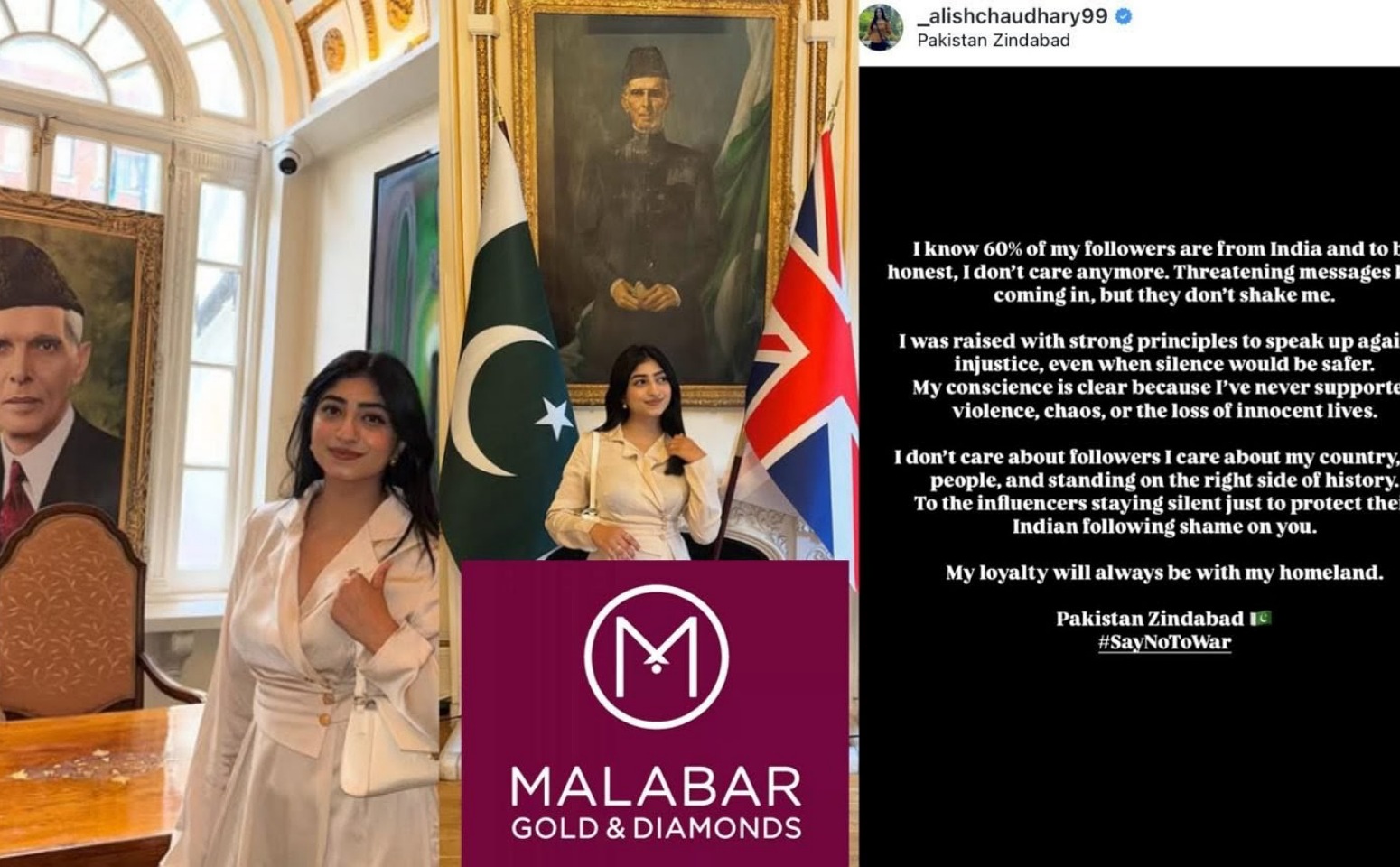
Hindu Voice Team: A major controversy has erupted around Kerala-based jewellery giant Malabar Gold & Diamonds after the company initiated legal proceedings seeking imprisonment of social media critics who highlighted its recent collaboration with a Pakistani influencer accused of making anti-India remarks mocking Operation Sindoor
The move has sparked widespread outrage, with free speech advocates, social media users, and several public figures condemning what they describe as an attempt to silence legitimate criticism through intimidation and misuse of judicial power.
The Collaboration That Sparked a Firestorm
The controversy began in early September 2025 when Malabar Gold & Diamonds held a lavish grand opening event for its new Birmingham showroom in the United Kingdom.
The event featured Bollywood actress Kareena Kapoor Khan as the brand ambassador — but it was the presence of Pakistani influencer Alishba Khalid that ignited an online storm.
Khalid, known for her beauty and lifestyle content on Instagram, had earlier referred to “Operation Sindoor” — India’s military retaliation against terror elements — as a “cowardly act.”
In her posts, she expressed strong support for Pakistan and made dismissive comments about her Indian followers, reportedly declaring,
“We will answer with truth and unshakable strength.”
Screenshots of these remarks began circulating across Indian social media platforms shortly after the Birmingham event, drawing fierce backlash against Malabar Gold for allegedly promoting an anti-India personality under its luxury brand banner.
The Company’s Response: Legal Threats Instead of Clarifications
Rather than issuing a public apology or clarification, Malabar Gold opted for a legal counterattack.
The company filed a defamation petition before the Bombay High Court, claiming that the online outrage and critical posts were malicious attempts to damage its brand reputation and hinder business ahead of the festive season.
In its submission before Justice Sandeep V. Marne, the company claimed that the influencer’s participation had been arranged through a third-party agency, JAB Studios, and that Malabar was unaware of her controversial posts at the time of the event.
The firm further stated that all professional ties with Khalid had since been severed and that competitors were exploiting the situation to tarnish the brand’s name.
Court Orders Content Removal, Grants Interim Injunction
After hearing the petition, the Bombay High Court issued an interim injunction directing social media platforms to take down 442 URLs that contained allegedly defamatory content about Malabar Gold & Diamonds.
The order included instructions for Google, Meta (Facebook and Instagram), X (formerly Twitter), and YouTube to block further circulation of such material until the case is heard in full.
However, the injunction also allowed the company to pursue contempt action against individuals who refused to comply with content takedown requests — a clause that has now become the focal point of public outrage.
Critics Threatened With Civil Imprisonment
Among those targeted by Malabar’s legal action is social media user Vijay Patel (@vijaygajera), known for his nationalist commentary.
Patel posted a series of tweets criticizing Malabar’s association with the Pakistani influencer, demanding accountability and a formal apology from the brand.
In response, he reportedly received a legal notice warning that failure to comply with the injunction could lead to civil imprisonment of up to three months.
Patel responded defiantly on X, stating:
“I am ready to go to jail for the pride of our Army. Let’s see who wins — your money, your power, or the truth and unity of Indians.”
His message quickly went viral, with thousands expressing solidarity under hashtags such as #BoycottMalabarGold and #FreeSpeechUnderThreat.
Free Speech vs Corporate Power
Legal experts and civil society organizations have criticized the company’s approach as a dangerous precedent for corporate suppression of dissent.
“This is an extreme misuse of civil law to stifle criticism,” said a senior advocate from Mumbai, requesting anonymity.
“Defamation cases are meant to protect reputations, not to threaten citizens with jail for expressing their views — especially when the criticism concerns matters of national sentiment.”
Several commentators also noted that the optics of an Indian brand defending a Pakistani influencer who had insulted the Indian military could prove far more damaging than the original criticism itself.
Malabar Gold’s Global Standing and Image Crisis
Founded in Kerala in 1993, Malabar Gold & Diamonds has grown into one of the world’s largest jewellery retail chains, with more than 340 showrooms across 13 countries, including India, the UAE, the UK, and the US.
The company has long projected itself as an Indian-origin global brand rooted in “ethical business and cultural harmony.”
However, this incident has raised sharp questions about brand accountability, vetting of foreign collaborators, and the role of consumer activism in the age of digital influence.
Analysts warn that this controversy could affect the company’s festive-season sales and public trust, especially among patriotic customers in India and the diaspora.
Public Sentiment: Outrage and Boycott Calls Intensify
Online anger has continued to mount. Many users have accused Malabar of hypocrisy — celebrating Indian festivals in advertisements while associating with individuals perceived as hostile to Indian interests.
Calls for a nationwide boycott of the brand have trended repeatedly on X and Facebook, while prominent public figures have urged the company to withdraw the case and issue a transparent apology.
The Malabar Gold & Diamonds controversy reflects a broader conflict between corporate power and public accountability in the digital era.
By choosing courtroom coercion over public dialogue, the company has turned a marketing misstep into a freedom-of-expression flashpoint — one that could shape how Indian brands handle global partnerships and social criticism in the future.
Whether the company’s legal offensive will restore its reputation or further alienate its consumers remains to be seen.
For now, Malabar Gold finds itself on trial in the court of public opinion — as much as in a court of law.
(The above piece is written based on a report published by The Commune. You can read the original piece HERE )